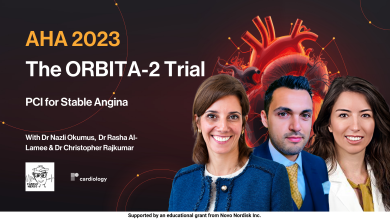Search results
PROMOTED
Author(s):
Nicolas M Van Mieghem
,
Kendra J Grubb
,
David Hildick-Smith
,
et al
Start date:
Mar 26, 2024
‘Primary’ Microvascular Angina
Author(s):
Gaetano Antonio Lanza
,
Juan Carlos Kaski
Added:
3 years ago
Article
Author(s):
Rasha Al-Lamee
,
Christopher Rajkumar
,
Nazli Okumus
Added:
5 months ago
AHA 2023 — Investigators of ORBITA-2 trial, Dr Rasha Al-Lamee and Dr Christopher Rajkumar (Imperial College London, UK) talked with CardioNerds Ambassador, Dr Nazli Okumus about the randomised, placebo-controlled trial (NCT03742050) that compared the effects of coronary angioplasty versus placebo procedure on symptoms of stable angina without background anti-anginal therapy at 12 weeks.The ORBITA…
View more
Author(s):
Eunice NC Onwordi
,
Amr Gamal
,
Azfar Zaman
Added:
3 years ago
Acute coronary syndromes (ACS) are a major cause of morbidity and mortality. Despite the use of optimal medical therapy and revascularisation there remains a significant risk of vascular events. Registry data indicates a persistent risk even in patients who are event free in the first year following ACS, with as many as 1 in 5 patients suffering a vascular event in the subsequent 3 years.1
The…
View more
Author(s):
Neil Ruparelia
Added:
3 years ago
Transcatheter aortic valve implantation (TAVI) is now the accepted treatment option of choice for patients presenting with severe symptomatic aortic stenosis who are deemed to be inoperable or of high surgical risk.1,2 Short- and intermediate-term outcomes have been promising3–5 and with increasing institutional and operator experience combined with technological advancements there has been…
View more
Cardioprotected Percutaneous Coronary Intervention - A Case Study in a Stable Angina Patient
Author(s):
Tim P van de Hoef
,
Werner Mohl
,
Ahmed A Khattab
,
et al
Added:
3 years ago
Article
Author(s):
Tom Ford
,
Colin Berry
Added:
3 years ago
Ischaemic heart disease persists as the leading global cause of death and lost life years in adults.1 Angina is a common clinical presentation of ischaemic heart disease related to a supply:demand mismatch of myocardial blood flow, typically provoked by exertion or stress. Invasive coronary angiography is the reference test for angina and identifies obstructive coronary artery disease (CAD) as a…
View more
Author(s):
Matthew Jackson
,
Azfar Zaman
Added:
3 years ago
Medical therapy has been the primary treatment for stable angina since nitroglycerin was first used in 1878. However, since the first successful percutaneous coronary intervention (PCI) procedure was performed in 1977, the role of PCI in patients with stable coronary artery disease (CAD) has been the subject of much study. Numerous trials have shown no reduction in death or myocardial infarction…
View more
Author(s):
Gabriele Pesarini
,
Sara Ariotti
,
Flavio Ribichini
Added:
3 years ago
Haemostasis is a complex phenomenon defined as the chain of mechanisms able to maintain the integrity of a closed, high-pressure circulatory system after vascular damage.1 Thrombogenesis represents the main process assuring haemostasis at each level of the vascular system, and its accurate regulation guarantees the correct balance between blood flow and damage repair. An uncontrolled thrombin…
View more
Ranil de Silva
Research Area(s) / Expertise:
Job title: Senior Lecturer in Clinical Cardiology and Consultant Interventional Cardiologist
Author















